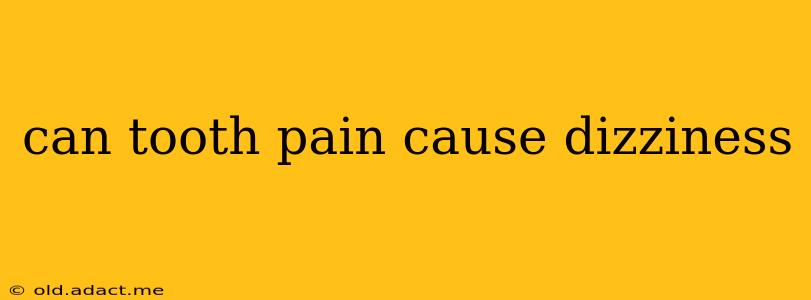Can Tooth Pain Cause Dizziness? Understanding the Connection
Tooth pain, a common ailment, can be incredibly disruptive. But did you know it might not be limited to just jaw discomfort? Many people report experiencing dizziness alongside their toothache. While not a direct cause-and-effect relationship in most cases, tooth pain can certainly indirectly lead to dizziness through several mechanisms. This article explores the potential links between tooth pain and dizziness, answering common questions surrounding this often-overlooked connection.
What causes dizziness when I have a toothache?
The connection between tooth pain and dizziness isn't always straightforward. Dizziness itself has various underlying causes, ranging from inner ear issues to dehydration. However, several pathways can link severe tooth pain to feelings of lightheadedness or vertigo:
-
Pain and Stress Response: Intense tooth pain triggers a significant stress response in the body. This can lead to increased heart rate, changes in blood pressure, and even shallow breathing – all factors that can contribute to dizziness or lightheadedness. The body's fight-or-flight response, activated by pain, can temporarily disrupt the body's equilibrium.
-
Dehydration: Severe tooth pain can sometimes lead to decreased fluid intake due to discomfort or nausea. Dehydration is a well-known cause of dizziness, further complicating the issue.
-
Infection and Inflammation: Untreated dental infections can spread, causing systemic inflammation. This widespread inflammation can affect various bodily functions, potentially influencing blood pressure and circulation, leading to dizziness. In severe cases, an infection can cause a fever, which itself can cause dizziness.
-
Medication Side Effects: Pain relievers, often taken for toothaches, can sometimes list dizziness as a side effect. Always read the medication label carefully and consult a doctor if you experience any unusual side effects.
-
Underlying Medical Conditions: In rare instances, dizziness accompanying tooth pain might indicate an underlying medical condition unrelated to the dental issue. For example, conditions affecting blood pressure or the inner ear could manifest with both symptoms.
Is dizziness a sign of a serious dental problem?
While dizziness itself is not necessarily a sign of a serious dental problem, its presence alongside severe tooth pain warrants a visit to the dentist. The dizziness could indicate that the underlying dental issue is more severe than initially thought, such as a significant infection requiring prompt treatment.
How long does dizziness from a toothache last?
The duration of dizziness related to tooth pain varies greatly depending on the cause and the severity of the pain. If the dizziness is caused by stress and pain, it may subside once the pain is managed. However, if it's linked to dehydration or infection, it may persist until the underlying issue is addressed. If dizziness persists for an extended period or is severe, it's crucial to seek medical attention.
Should I go to the ER for dizziness and tooth pain?
You should seek immediate medical attention if you experience dizziness along with severe tooth pain, especially if accompanied by:
- High fever
- Difficulty breathing
- Severe swelling
- Loss of consciousness
- Persistent or worsening dizziness
These symptoms could indicate a serious underlying medical problem requiring emergency care.
Can a tooth infection cause dizziness and nausea?
Yes, a serious tooth infection can absolutely cause dizziness and nausea. The infection's spread, resulting inflammation, and potential impact on blood pressure and hydration can lead to these symptoms. It's crucial to seek dental care promptly to address the infection and alleviate the accompanying symptoms.
In conclusion, while not a direct consequence in most cases, dizziness can accompany tooth pain through various indirect pathways. Paying attention to accompanying symptoms and seeking appropriate medical or dental care is crucial to ensure timely diagnosis and effective treatment. If you experience persistent or severe dizziness along with a toothache, consult a healthcare professional immediately.
